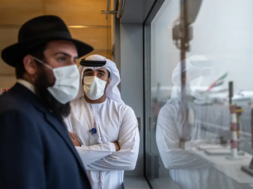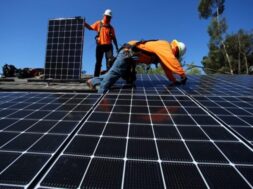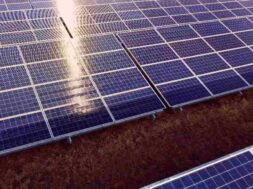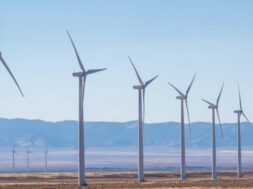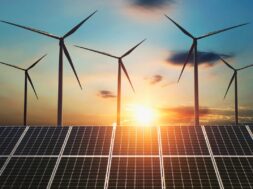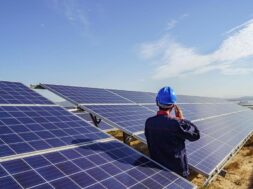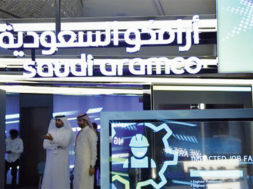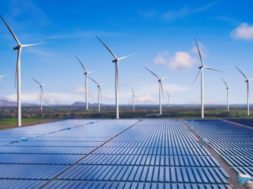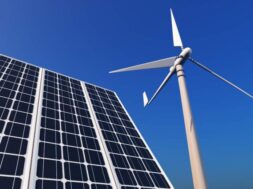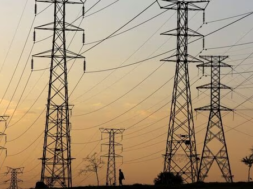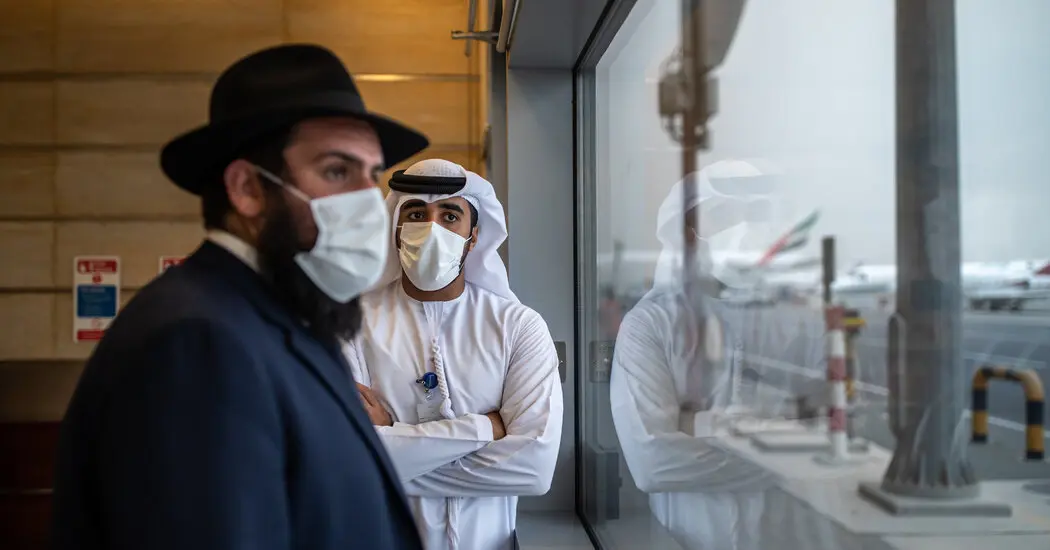
After the Abraham Accords, partnerships between companies in Israel and Arab countries have led to the kinds of initiatives that will be on the Davos agenda.
In December 2020, the Israeli company Watergen signed a partnership agreement with the Abu Dhabi-based multinational firm Al Dahra to install their fresh water production devices in the United Arab Emirates. The deal was notable both for its timing and the parties involved.
Arriving just two months after the signing of the Abraham Accords — an agreement forged by the Trump administration that established diplomatic relations between Israel and a handful of formerly adversarial Arab nations — the Watergen deal soon resulted in dozens of water production units operating in commercial and government buildings across the United Arab Emirates.
The partnership was among the first collaborations between Israel and these onetime foes aimed at combating climate-related challenges such as rising temperatures and shrinking water resources. Since then, nearly a half-dozen additional like-minded agreements have been discussed or reached, including a plan to generate hydrogen power in Morocco and a United States-supported and Emirates-funded deal for Jordan to sell solar power to Israel in exchange for fresh water.
As the World Economic Forum meets in Davos, Switzerland, next week, under the theme of “Cooperation in a Fragmented World,” the most unlikely of places — the Middle East — may be offering hints of how that can be achieved. Since the signing of the Abraham Accords, there has been progress on the diplomatic and economic fronts, but especially in addressing the global climate crisis — a major focus of the forum.
Kelsey Goodman, associate director for the Middle East and North Africa for the World Economic Forum, said “the climate and energy nexus is top of mind at the annual meeting,” particularly when it comes to the Mideast-North Africa region, known as MENA.
Those nations are expected to turn out in record numbers at Davos, whose talks are being seen as a springboard for next year’s COP28 climate summit to be held in Dubai, Ms. Goodman said. The trend, she said, toward greater engagement on climate issues from MENA policymakers and business leaders is a reflection of momentum on climate solutions in the region.
The accords have played a role in driving that momentum, experts said. Spearheaded by Jared Kushner, former President Donald J. Trump’s son-in-law and a presidential adviser, they ushered in a long-eluded normalization between Israel and the United Arab Emirates, Bahrain, Morocco and Sudan.
Since then, agreements on defense and tourism have been reached between Israel and the Persian Gulf states; over the past two years, for instance, with the country now open to them, some 500,000 Israelis visited the Emirates.
The Emirates also recently signed a first-of-its-kind deal to acquire Israeli-made air defense systems. And academic cooperation partnerships, like the one between Israel’s University of Haifa and the Emirates’ Zayed University for joint research on environmental issues, have been formed.
But with their shared desert topography and collective climate crises, green partnerships like the Watergen agreement have become among the most vibrant arenas for cooperation. Israel provides decades of environmental research, technology and manufacturing, while the oil-rich gulf nations deliver funding and access to new markets.
“This type of regional harmonization makes a lot of sense,” Ms. Goodman said, “because the Middle East and gulf are far more suited to tech-based — rather than nature-based — environmental solutions” to climate change. “Embracing alternative technologies is far more ideal in this region than, say, trying to plant new forests in deserts without water,” Ms. Goodman added.
The accords are not without controversy, particularly involving Sudan’s addition to the group. But shared problems — as well as the potential for making enormous sums of money — are helping the nations overcome decades of discord and demonstrating how cross-border cooperation could lead to meaningful solutions, experts said.
“We are coming with technology, they are coming with technology, we are coming with funding and they are coming with funding,” said Amir Hayek, Israel’s first-ever ambassador to Abu Dhabi, about the nations’ environmental agreements. “Israel and the U.A.E. are cooperating on a fully equal level.”
Michael Rutman, co-chief executive of Watergen, whose atmospheric water generation systems are capable of converting vapor into potable water, said cooperation makes sense. “Israel and the U.A.E. are two countries with an intuitive understanding of what it means to live with a shortage of fresh water,” he said.
In the Emirates, some 90 percent of the drinking water is supplied through desalination, an expensive and energy-intensive process. Yet while the Emirates — the third richest country in the world — may be able to afford desalination, the nation is paying a high environmental cost because of the fossil fuels consumed and the vast quantities of hypersaline water it leaves behind.
“The salty, briny water is very, very hard on the environment,” Mr. Rutman said.
In 2021, a trilateral energy-for-water agreement was signed by Israel, Jordan and the United Arab Emirates. Under this plan — which was achieved with help from the U.S. State Department — the Emirates-backed renewable energy company Masdar will construct a sizable solar-power facility in Jordan that will generate electricity and sell it to Israel.
At the same time, Israel will sell desalinated water to Jordan, whose water-shortage crisis is compounded by climate change and population growth. As in the Emirates, desalination is energy intensive, but importing desalinated water from Israel is far cheaper and less environmentally taxing for Jordan, a poorer nation that lacks large-scale desalination facilities.
Although Jordan and Israel established diplomatic ties in 1994, the relationship — much like Israel’s with Egypt since the 1979 peace accords — has deteriorated. The continued impasse over Palestinian statehood, in particular — especially for Saudi Arabia and Jordan, Israel’s neighbor — has impeded the complex cooperation necessary for multilateral deals like the Israel-Jordan-Emirates plan, also known as Project Prosperity, experts said.
“But the new regional politics associated with the Abraham Accords and the key role of the U.A.E. in this process have made it less difficult for Jordan and Israel to execute initiatives” like Project Prosperity, said Daniel Weiner, vice president for global affairs at the University of Connecticut and founder of its Abrahamic Programs for Academic Collaboration.
Ebtesam Al-Ketbi, president of the Emirates Policy Center, a political think tank in Abu Dhabi, called initiatives like Project Prosperity “one of several positive outcomes from the Abraham Accords.”
The accord between Israel and Morocco led to a large and potentially significant deal, signed last November, between the Israeli hydrogen production company H2Pro and Gaia Energy in Morocco, which focuses on renewable energy projects across North Africa and Egypt.
Under the agreement, H2Pro plans to build a green hydrogen production facility powered by Morocco’s abundant wind and sunlight. The hydrogen will be exported to Europe for industrial use.
H2Pro will initially construct a modest sized test facility in Morocco, but potential for growth lies in Europe’s untapped green hydrogen market, which is expected to swell as global demand rises more than sevenfold by 2050, according to a recent McKinsey & Company survey.
Rotem Arad, H2Pro’s director of business development, said the company has plans to scale production “all the way up to the gigawatt level, which is potentially worth hundreds of millions of dollars.”
For H2Pro and other Israeli companies, the accords may open markets not just within the region but in Asia, India, China and beyond.
“If Israel was once known as the ‘start-up nation,’” said Mr. Rutman from Watergen, “the next decade of gulf partnerships will see us become the ‘scale up’ nation.”
Experts said the projects also have the potential to ease some of the worst effects of climate change.
“Of course it depends on the specific project, but these arrangements and agreements can have a positive impact on meeting the challenges of the climate crisis, but only if the governments involved make regional climate resilience and security a clear priority,” said Gidon Bromberg, Israeli director of EcoPeace Middle East, which helped develop Project Prosperity.
H2Pro’s Moroccan deal was signed last year in the Egyptian resort town of Sharm el Sheikh, which played host to COP27, the annual global climate summit. The conference — the first since both the pandemic and the Abraham Accords — marked a coming-out of sorts for Israel’s green-tech sector.
“For the first time ever, Israel showcased a full-scale pavilion at COP and we are already working on plans for COP28 next year in Dubai,” said David Saranga, head of digital at the Israeli Ministry of Foreign Affairs, who attended the conference and whose digital diplomacy heavily focuses on sustainability issues. Mr. Arad of H2Pro said, “because of the Accords, we no longer had to operate behind the curtain or under the radar at COP” when negotiating deals with former Arab rivals.
Despite the accords’ initial successes, it will be difficult to maintain the current relationships and expand to additional nations without the participation of the Palestinian Authority, experts said.
“First and foremost, we must see cooperation between Israel, Jordan and the Palestinians,” said Mr. Bromberg. “Their presence is critical in ensuring that projects like the Project Prosperity move forward.”
The arrival of Israel’s new hard-line government also makes it more difficult for the Jewish state to formalize relations with additional Arab nations, particularly with the regional leader, Saudi Arabia.
While some nations may be tempted by the potential economic benefits, that may not be enough to entice holdout nations to put their hostilities aside, experts said. “A fair peace between the Palestinians and Israelis will increase the likelihood of expanding the scope of the Abraham Accords,” said Dr. Al-Ketbi.
